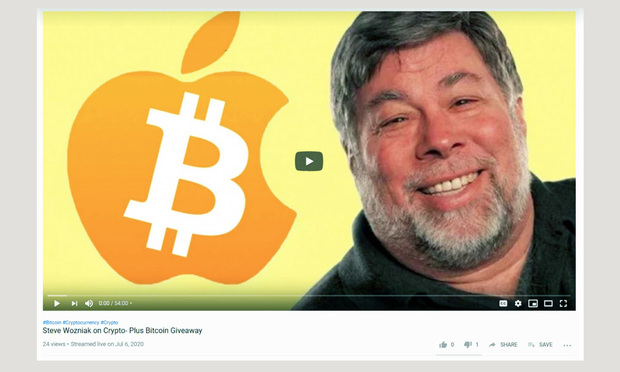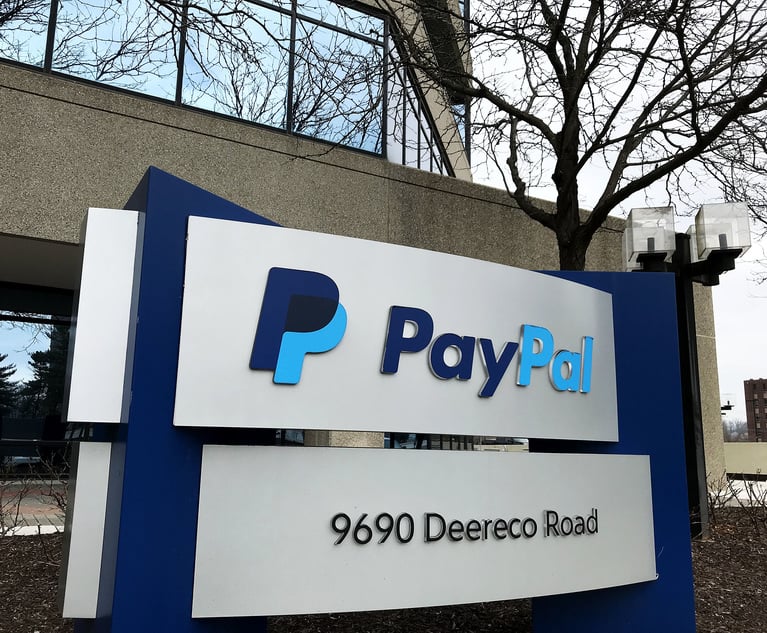Apple Co-Founder Steve Wozniak Sues YouTube Over Cryptocurrency Scheme
The lawsuit, filed by Cotchett, Pitre & McCarthy, compares YouTube's handling of cryptocurrency scams that have used images of Wozniak, Bill Gates and Elon Musk to Twitter's response to last week's hack leveraging the accounts of high-profile users.
July 22, 2020 at 03:29 PM
3 minute read
 Image from complaint where Apple co-founder Steve Wozniak is suing YouTube and parent company Google for failing to shut down cryptocurrency schemes that bear his likeness on the platform.
Image from complaint where Apple co-founder Steve Wozniak is suing YouTube and parent company Google for failing to shut down cryptocurrency schemes that bear his likeness on the platform.
Apple co-founder Steve Wozniak is suing YouTube and parent company Google for failing to shut down cryptocurrency schemes that bear his likeness on the platform.
Wozniak isn't the first entrepreneur to bring litigation against the website for fake giveaways that phish users out of millions of dollars in digital assets. Ripple Labs Inc. CEO Bradley Garlinghouse brought similar claims against the social media giant earlier this year.
Cotchett, Pitre & McCarthy in Burlingame, California, filed the suit on behalf of Wozniak and 17 international victims of the video scams Tuesday in the San Mateo County Superior Court.
The complaint contrasts YouTube's handling of the fraud with Twitter's response last week to a hack and bitcoin scam that leveraged high-profile accounts to make off with $120,000 in bitcoin payments.
"That same day, Twitter acted swiftly and decisively to shut down these accounts and to protect its users from the scam, issuing the above apology," wrote Cotchett Pitre's Joseph Cotchett; Brian Danitz; Julia Peng; Andrew F. Kirtley; and Noorjahan Rahman. "In stark contrast, for months now, Defendant [YouTube] has been unapologetically hosting, promoting, and directly profiting from similar scams."
YouTube did not immediately respond to a request for comment Wednesday morning.
A version of the scam uses videos and images of Wozniak to purport that the tech icon is hosting a live bitcoin giveaway, where users send over their bitcoin and get twice as much back. But the users give away their bitcoin and get nothing back, according to the lawsuit.
"With full knowledge of this scam, [YouTube] resisted taking the scam videos down, allowed them to multiply, and contributed to the scam by making them appear legitimate," the complaint states. "[YouTube and Google] took the further step of promoting and profiting from these scams by providing paid advertising that targeted users who were most likely to be harmed."
In April, Boies Schiller Flexner represented Ripple and Garlinghouse in a trademark infringement suit against YouTube for failing to shut down the scheme. The Cotchett Pitre attorneys claim the scams have also borne the images of Bill Gates, Elon Musk, Dell Technologies' Michael Dell, and personal finance educator Robert Kiyosaki.
Wozniak is suing YouTube for violation of right of publicity, misappropriation of name or likeness, fraud or misrepresentation, aiding and abetting fraud, unfair business practices and negligent failure to warn.
Although the filing underlines that Section 230 of the Communications Decency Act "continues to play a vital and important role in ensuring free and open expression and debate on the Internet with a minimum of government regulation," Cotchett Pitre's Danitz said in a phone interview Wednesday that Section 230 does not protect the kind of misconduct that is alleged in the complaint.
This content has been archived. It is available through our partners, LexisNexis® and Bloomberg Law.
To view this content, please continue to their sites.
Not a Lexis Subscriber?
Subscribe Now
Not a Bloomberg Law Subscriber?
Subscribe Now
NOT FOR REPRINT
© 2025 ALM Global, LLC, All Rights Reserved. Request academic re-use from www.copyright.com. All other uses, submit a request to [email protected]. For more information visit Asset & Logo Licensing.
You Might Like
View All
'Biggest Influencer Scam of All Time'?: PayPal Accused of Poaching Commissions Via Its 'Honey' Browser Extension



As AI-Generated Fraud Rises, Financial Companies Face a Long Cybersecurity Battle
Law Firms Mentioned
Trending Stories
- 1Lavish 'Lies' Led to Investors Being Fleeced in Nine-Figure International Crypto Scam
- 2AstraZeneca Files Flurry of Lawsuits to Protect Cancer Treatment Drug
- 3American Airlines Legal Chief Departs for Warner Bros. Discovery
- 4New Montgomery Bar President Aims to Boost Lawyer Referral Service
- 5Deadline Extended for Southeastern Legal Awards
Who Got The Work
Michael G. Bongiorno, Andrew Scott Dulberg and Elizabeth E. Driscoll from Wilmer Cutler Pickering Hale and Dorr have stepped in to represent Symbotic Inc., an A.I.-enabled technology platform that focuses on increasing supply chain efficiency, and other defendants in a pending shareholder derivative lawsuit. The case, filed Oct. 2 in Massachusetts District Court by the Brown Law Firm on behalf of Stephen Austen, accuses certain officers and directors of misleading investors in regard to Symbotic's potential for margin growth by failing to disclose that the company was not equipped to timely deploy its systems or manage expenses through project delays. The case, assigned to U.S. District Judge Nathaniel M. Gorton, is 1:24-cv-12522, Austen v. Cohen et al.
Who Got The Work
Edmund Polubinski and Marie Killmond of Davis Polk & Wardwell have entered appearances for data platform software development company MongoDB and other defendants in a pending shareholder derivative lawsuit. The action, filed Oct. 7 in New York Southern District Court by the Brown Law Firm, accuses the company's directors and/or officers of falsely expressing confidence in the company’s restructuring of its sales incentive plan and downplaying the severity of decreases in its upfront commitments. The case is 1:24-cv-07594, Roy v. Ittycheria et al.
Who Got The Work
Amy O. Bruchs and Kurt F. Ellison of Michael Best & Friedrich have entered appearances for Epic Systems Corp. in a pending employment discrimination lawsuit. The suit was filed Sept. 7 in Wisconsin Western District Court by Levine Eisberner LLC and Siri & Glimstad on behalf of a project manager who claims that he was wrongfully terminated after applying for a religious exemption to the defendant's COVID-19 vaccine mandate. The case, assigned to U.S. Magistrate Judge Anita Marie Boor, is 3:24-cv-00630, Secker, Nathan v. Epic Systems Corporation.
Who Got The Work
David X. Sullivan, Thomas J. Finn and Gregory A. Hall from McCarter & English have entered appearances for Sunrun Installation Services in a pending civil rights lawsuit. The complaint was filed Sept. 4 in Connecticut District Court by attorney Robert M. Berke on behalf of former employee George Edward Steins, who was arrested and charged with employing an unregistered home improvement salesperson. The complaint alleges that had Sunrun informed the Connecticut Department of Consumer Protection that the plaintiff's employment had ended in 2017 and that he no longer held Sunrun's home improvement contractor license, he would not have been hit with charges, which were dismissed in May 2024. The case, assigned to U.S. District Judge Jeffrey A. Meyer, is 3:24-cv-01423, Steins v. Sunrun, Inc. et al.
Who Got The Work
Greenberg Traurig shareholder Joshua L. Raskin has entered an appearance for boohoo.com UK Ltd. in a pending patent infringement lawsuit. The suit, filed Sept. 3 in Texas Eastern District Court by Rozier Hardt McDonough on behalf of Alto Dynamics, asserts five patents related to an online shopping platform. The case, assigned to U.S. District Judge Rodney Gilstrap, is 2:24-cv-00719, Alto Dynamics, LLC v. boohoo.com UK Limited.
Featured Firms
Law Offices of Gary Martin Hays & Associates, P.C.
(470) 294-1674
Law Offices of Mark E. Salomone
(857) 444-6468
Smith & Hassler
(713) 739-1250






